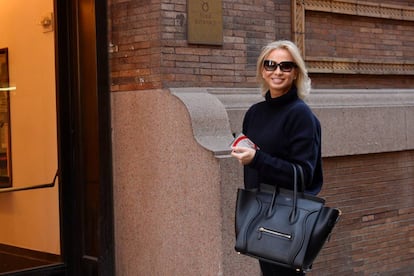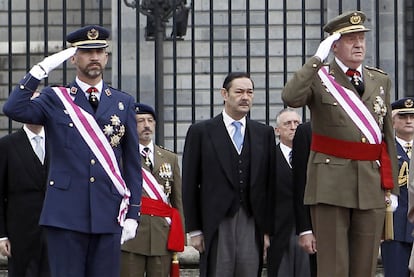Swiss prosecutor investigating alleged million-euro donation to friend of Spain’s former king
Corinna Larsen says the money was given to her by Juan Carlos I, but insists that it was a gift


A public prosecutor in Switzerland has been investigating a multi-million-euro donation received by Corinna Larsen, a friend of former Spanish King Juan Carlos I, from a Swiss bank account linked to a Panamanian foundation, according to a number of sources close to the judicial probe who have been consulted by EL PAÍS.
The documents where these payments are reflected were found during searches ordered by the prosecutor, Yves Bertossa, in the offices of the Geneva-based asset manager Arturo Fasana and the lawyer Dante Canonica, both of whom are linked to the network of companies that is currently being investigated by the prosecutor. Fasana was also investigated as part of the sprawling “Gürtel” case, a kickbacks-for-contracts network involving Spain’s conservative Popular Party (PP). He was probed for having moved funds for the businessman at the center of that case, Francisco Correa.
Our client has no place in these proceedings and we await their prompt conclusionRobin Rathmell, lawyer for Corinna Larsen
Bertossa, who has been on this case since the summer of 2018, is investigating Larsen, Fasana and Canonica, who were all summoned to appear in court for statements. Also summoned as part of the investigation were representatives from the Mirabaud private bank. It was from there that the alleged donation was transferred into an account in Larsen’s name in another bank in the tax haven of the Bahamas.
According to sources from the investigation, Larsen has justified the origin of the money with documents that confirm that the funds came from a donation made by a Panamanian foundation, which transferred the money in 2012.

Answering questions from EL PAÍS, Larsen’s lawyer, Robin Rathmell, stated: “In 2012, our client received an unsolicited gift from the emeritus king [of Spain], who described it as a form of donation for her and her son, of whom he had become fond. He had suffered several years of bad health, during which time our client took care of him. The donation was documented as a gift and the banks carried out their obligation and due diligence relating to the funds. Our client has no place in these proceedings and we await their prompt conclusion.”
According to the documents seized by Bertossa, the assets held by the foundation that made the donation to Larsen totaled around $100 million, and had come from another donation that was made in the year 2007 by the Saudi royal family’s Finance Ministry to the beneficiary of the account in Mirabaud bank. At that time, the Saudi king was Abdullah bin Abdulaziz Al Saud, who died in 2015. This and other information about the bank account and its movements were contained in the request for judicial assistance sent by Bertossa to Spanish High Court Judge Manuel García Castellón, according to a number of judicial sources.
Prosecutors are investigating possible ties between the alleged donation and the contract to build the high-speed rail link to Mecca
Bertossa is investigating whether the money deposited in Corinna Larsen’s account is related to the awarding of the contract to build a high-speed AVE rail link to Mecca, a project that was eventually carried out by a consortium of Spanish companies. In a memo sent by Larsen’s lawyer to the prosecutor on November 12 of last year, and to which this newspaper has had access, the attorney denies this and stresses that the funds were a donation. Larsen’s lawyer, who requests that his client be referred to as Corinna zu Sayn-Wittgenstein, told EL PAÍS: “Separately, the AVE deal, which deserves to be subject to so much investigation and in which our client did not participate, has no connection with these funds. A rudimentary look at the timeline of the origin of these funds clearly shows this.”
Lawyers for Fasana and the rest of those under investigation also deny any relationship with the the supposed payment of commissions for the Mecca train link.
The Swiss prosecutor has sent letters of request to Judge García Castellón asking for the information that has gathered about the case. Bertossa traveled to Madrid several weeks ago and spoke with the Spanish judge, with the chief corruption prosecutor Alejandro Luzón, and with Ignacio Stampa and Miguel Serrano, the prosecutors handling a case known as Carol. That case, which has since been shelved, was opened after a recording emerged of Larsen stating that emeritus king Juan Carlos had bank accounts hidden in Switzerland.
Also at the meeting with Bertossa was the Spanish prosecutor Luis Pastor, who is currently investigating the alleged payment of commissions relating to the Mecca AVE line. Pastor recently took statements from Corinna Larsen and the Iranian intermediary Shapari Zanganeh. During the meeting between prosecutors, information was exchanged and a mechanism was established for cooperation in the open investigations in Switzerland.
Larsen and Spain
The relationship between Corinna Larsen and Spain’s king emeritus came into the public spotlight as a result of the 2012 accident that Juan Carlos suffered in Botswana, where they were both on a hunting safari. The incident damaged the monarch’s reputation and was partially behind his surprise decision to abdicate in 2014.
The Monaco-based businesswoman, who continues to use her German ex-husband’s aristocratic title, zu Sayn-Wittgenstein, also made headlines in 2018 when a recording emerged in which she claimed she had been used as a front to conceal some of Juan Carlos’ wealth. The recording was one of many made by a former police commissioner named José Manuel Villarejo, who is at the heart of a series of judicial investigations into 20 years’ worth of wiretaps and other invasions of privacy against scores of politicians, business people, judges and journalists in Spain.
English version by Simon Hunter.
Tu suscripción se está usando en otro dispositivo
¿Quieres añadir otro usuario a tu suscripción?
Si continúas leyendo en este dispositivo, no se podrá leer en el otro.
FlechaTu suscripción se está usando en otro dispositivo y solo puedes acceder a EL PAÍS desde un dispositivo a la vez.
Si quieres compartir tu cuenta, cambia tu suscripción a la modalidad Premium, así podrás añadir otro usuario. Cada uno accederá con su propia cuenta de email, lo que os permitirá personalizar vuestra experiencia en EL PAÍS.
¿Tienes una suscripción de empresa? Accede aquí para contratar más cuentas.
En el caso de no saber quién está usando tu cuenta, te recomendamos cambiar tu contraseña aquí.
Si decides continuar compartiendo tu cuenta, este mensaje se mostrará en tu dispositivo y en el de la otra persona que está usando tu cuenta de forma indefinida, afectando a tu experiencia de lectura. Puedes consultar aquí los términos y condiciones de la suscripción digital.








































